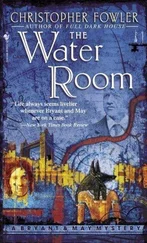Christopher Fowler - Personal Demons
Здесь есть возможность читать онлайн «Christopher Fowler - Personal Demons» весь текст электронной книги совершенно бесплатно (целиком полную версию без сокращений). В некоторых случаях можно слушать аудио, скачать через торрент в формате fb2 и присутствует краткое содержание. Жанр: Триллер, на английском языке. Описание произведения, (предисловие) а так же отзывы посетителей доступны на портале библиотеки ЛибКат.
- Название:Personal Demons
- Автор:
- Жанр:
- Год:неизвестен
- ISBN:нет данных
- Рейтинг книги:4 / 5. Голосов: 1
-
Избранное:Добавить в избранное
- Отзывы:
-
Ваша оценка:
- 80
- 1
- 2
- 3
- 4
- 5
Personal Demons: краткое содержание, описание и аннотация
Предлагаем к чтению аннотацию, описание, краткое содержание или предисловие (зависит от того, что написал сам автор книги «Personal Demons»). Если вы не нашли необходимую информацию о книге — напишите в комментариях, мы постараемся отыскать её.
A hotel offers a taboo service for its troubled clients, a vampire library attacks its readers, and a young man discovers the cutlery of the Marquis de Sade. Incarceration, incantations, romance, revenge and the end of the world occur in this collection of gothic tales.
Personal Demons — читать онлайн бесплатно полную книгу (весь текст) целиком
Ниже представлен текст книги, разбитый по страницам. Система сохранения места последней прочитанной страницы, позволяет с удобством читать онлайн бесплатно книгу «Personal Demons», без необходимости каждый раз заново искать на чём Вы остановились. Поставьте закладку, и сможете в любой момент перейти на страницу, на которой закончили чтение.
Интервал:
Закладка:
When he unlatched the front door and looked out, he was surprised to find snow drifting in the hall. It had been nearly two months since his last foray into the streets of what had once recognisably been Camden Town. The tall windows at the end of the floor had been broken by children, and the snow had formed a drift below the sill. If any of his neighbours still lived in the building, they were not prepared to answer his knock. Kallie rapped on Mr Jakobowski's door and listened with his ear placed to the peeling brown paintwork.
'Mr Jakobowski, I'm going outside. Do you want me to get you anything?'
He was sure he could hear someone moving around in the sitting room, but what could he do if the old man wasn't prepared to let anyone help him? In these strange times, who knew how people would behave? Something electrical hummed beyond the door. It sounded as if he had a radiator running in there. People jealously hoarded their heat sources. Who could blame them? Heat was hard to share; if you opened the circle it dissipated. He called a few more times, then gave up. In the past, when he had found anything he thought the old man might like, he would haul it home and leave it against his door. But the good-neighbour rules were no longer in force; now it was every man for himself.
Down the icy stairwell – the lift had not worked in thirteen years – to the front door, which was so frozen shut that Kallie assumed no-one had been in or out since Bennett had left with the contents of his wallet. Deadening whiteness glared in through the window panels. He would need to find sunglasses. He had tried to pick up ski equipment from Lillywhites the last time he was in town, but – surprise, surprise – they had sold out. Only a handful of staff still manned the store, keeping up the old conventions. He had worked there himself once, bored out of his mind, waiting to seize upon the odd straggling customer who had made it in through the snow. That was back when the market was still trying to cope with the crisis, when the rich warm nations were still exporting to their poor frozen neighbours. Now that those neighbours had ceased to earn wages, there was no point in supplying them with affordable products. The milk of human kindness had been the first thing to freeze.
Throwing his weight against the door, he shifted it wide enough to push his way through. Bayonets of ice divorced themselves from the lintel and fell about him, cutting stencils into the swathes of snow that crusted the steps. Kallie raised his face into the biting wind and looked along the street, in the direction of the city. The air stole his breath, forcing a gasp with the realisation that it was far colder than anything he had experienced before.
Snow dunes, sparkling like hills of granulated jewels, swept in great unspoilt arcs across a bleached Sahara of roads and pavements. This was a bad sign; the route had been passable the last time he ventured out. But now even those high-profile charity missions the government was fond of announcing had ceased while everyone sorted out the problems in their own back yards.
On his last trip, Kallie had seen a few heavy-traction vehicles lumbering toward town. No people, though. There were never any people. It was simply too dangerous to set out on your own. He vaguely recalled a shopping expedition with his parents, and some friends of theirs who owned a car fitted with snowtyres. His mother had bought crazy things, pointless things, floral dresses and summer blouses she would never be warm enough to wear. Anxious to be rid of their stock, the storekeepers had been bargained down to nothing. He would always remember his mother laughing in front of the mirror as she held the diaphanous chiffon material against her. Ironically, her refusal to lose hope had brought her to a protracted, painful end.
What had instilled his parents with such unreasoning optimism? Was it because they remembered a time when their world was a cacophony of movement and sound, when trees still flowered, when their vision was saturated with rainbow colours? Had they never lost sight of life's possibilities? Is that why they had allowed him to be born?
It took forty minutes to reach the deserted high street, silent but for the wind that moaned eerily around the corners of buildings like a widow at a wake. At Camden Lock the ice in the canals had expanded and crushed itself upwards into fantastic twisted geometries. Kallie pulled the fur hood of his coat tighter around his face and concentrated on placing one foot before the other. The secret was to keep moving, always keep moving.
There were no shops open at all in the high street. This was a worrying new development. Surely some signs of life still existed? In the last few years he had seen fewer and fewer people on the crystalline streets. Many had found ways of moving to the southern hemisphere. Some had chosen to stay because they were determined to rebuild their lives in the face of the changed climate. And there were the others, the ones who had no money and no way of leaving alive.
As he trudged on, staying wide of the treacherously deep drifts, he remembered a picture he had seen once, a framed tube poster from the 1930s. The fanciful painting showed a gigantic cherub with translucent blue skin, a symbolic representation of the North Wind, perched on the roof of Oxford Circus tube station, breathing icy air down over the scurrying populace. The message was something about getting in out of the cold. Such bright pigments, such warmth, all gone now, gone forever. The sheer white force of snow and ice blotted every other colour from the landscape.
He resolved to walk as far as the giant supermarket at the end of the road, and no further. Beyond lay the crusted ridge of permafrost that had built up in the warring crosswinds of the Euston Road. Passing near it always unnerved him; there were people in the ice, frost-blackened hands and faces staring out like half-uncovered statues. It wasn't right that they had been left there, but what could anyone do? After a few years the ice turned to stone, shifting and rupturing like the tectonic plates of the earth.
The Safeway car park was almost empty. The attendant's barrier was up, and from the lack of tyre tracks it looked like nothing had driven in or out for days. The long glass wall of the supermarket glittered with frost, and was covered in starburst cracks where the great weight of snow was slowly pushing it in, but at least the lights were still on inside, and that meant the store was open for business. Kallie had no money on him, but with luck there would be no staff to operate the tills. Many people continued to conduct a semblance of normal life, as if determined to prove that the British could remain polite in the direst of circumstances, but were easily turned from their daily tasks. Nothing could be relied upon any more, beyond the fact that the situation would worsen.
The only advantage of the new cold climate was that food stayed fresher. Just as well; supplies were sporadic and perverse. Trucks would deliver great quantities of razorblades or suntan lotion, but there would be no bread or meat. Sometimes fresh-looking food would prove to have been frozen for years, and was impossible to thaw.
The temperature inside the store was, oddly enough, too high. Because of the value of its vast cold storage capacity, Safeway operated on its own generator but the thermostats must have become damaged in the recent storms. To be hit by the smell of rotting meat was one final cruel consumerist joke to play on the few half-starved members of the public who still ventured through its doors.
Kallie unbuttoned his coat and fought the desire to vomit as he tried to ignore the sweet, ripe smell of putrifying vegetables. It was no use trying to refreeze food that had thawed. He would have to stick to tins again.
Читать дальшеИнтервал:
Закладка:
Похожие книги на «Personal Demons»
Представляем Вашему вниманию похожие книги на «Personal Demons» списком для выбора. Мы отобрали схожую по названию и смыслу литературу в надежде предоставить читателям больше вариантов отыскать новые, интересные, ещё непрочитанные произведения.
Обсуждение, отзывы о книге «Personal Demons» и просто собственные мнения читателей. Оставьте ваши комментарии, напишите, что Вы думаете о произведении, его смысле или главных героях. Укажите что конкретно понравилось, а что нет, и почему Вы так считаете.












